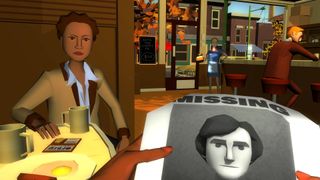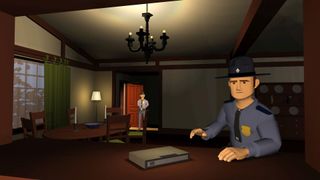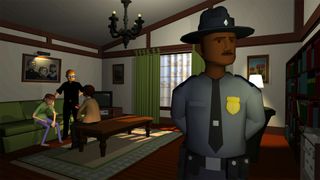Virginia: an adventure inspired by Twin Peaks and The X-Files

I love that Twin Peaks manages to keep finding new generations of fans, to the extent that this ever-growing morass of people has somehow summoned it back to TV 25 years after it first aired. Twin Peaks was the progenitor of modern, credible serialised television. But its influence has extended beyond TV and into our medium, where the likes of Deadly Premonition and Alan Wake have borrowed liberally from the series’ oddball mix of comedy and drama, and reinterpreted that through their own creators’ voices. Variable State’s Virginia is a confident first-person mystery that also feels like it lives in a slightly twisted version of that world, complete with a similar missing-person premise and a suggestion of macabre supernatural forces at work.
I begin the ten-minute demo at night by a car in the middle of a forest. The viewpoint cuts to a lake in the middle of tall green trees, then to a corridor of red trees where the leaves of one turn into hundreds of origami birds that scatter and leave the branches bare. We move to a diner that is straight-up based on the Double R from Twin Peaks, and now I’m sitting opposite my FBI partner. This is tone-setting stuff. The premise of the story is relayed a bit later through two key scenes: one where you’re handed a dossier by your boss with an order to investigate your partner, and another in a family home where police are standing around an upset family whose son has gone missing. It’s not utterly Twin Peaks, but the stirring music straddles the line between early X-Files synth and Badalamenti grim.

“I’d say we perhaps leaned a little heavily on the Twin Peaks references in our demo,” creative director Jonathan Burroughs admits. “Our intention isn’t to parody or pastiche that TV program, fond of it as we are. But we’ve certainly inherited some of the premise; both our story and Twin Peaks’ deal with outsiders entering a closed community, with a harrowing crime and with paranormal occurrences. We’re also fascinated by Twin Peaks’—and I think this is true of many David Lynch films—mixture of the mundane and the extraordinary. But Virginia will be an original story.”
There are other ways Virginia feels like its own world outside of Twin Peaks, too. The snippets of story in this demo are delivered entirely by character animation and environmental details—no dialogue or voice acting. The way the boy’s disappearance is telegraphed by the family paintings on the walls of the house where his obviously distraught parents are talking to detectives. It oddly reminds me of the Buffy episode Hush in the way that characters mime to tell the story, though I wonder about the challenge of doing that across the entire game. “In part, it was a practical decision,” Burroughs says. “Virginia will feature quite a large cast and, given that we’re only three developers, were we to pursue full voice acting, we were worried about the time we would have to devote to iterating on voice performance and making sure it was of the best quality, in addition to wanting to put time and effort into the animation and physical performances. But I was also worried about conversations slowing the game down. Our story is told at quite a pace, and I genuinely think dialogue between the player and other characters may have felt like an unwanted interruption.”

“I like that we are not giving people a very precise explanation of every scene, that they have the chance to interpret each interaction and put the story together for themselves,” adds art director Terry Kenny. “That is quite satisfying. There is a lot to be gleaned from that Buffy episode, though; it’s an inventive and compelling show because of the constraints it has set for itself. The score is great and it’s visually a striking episode. I guess in Hush, everyone is aware that their voice is gone, whereas we need to find naturally silent moments in our story and communicate the necessary details in other ways.”
In terms of moment-to-moment play, Virginia won’t have puzzles or padding. This is just telling the story. “It is intentionally light on mechanics,” Burroughs tells me. “Our aim is that it is first and foremost a drama you participate in... we’ve quite purposefully avoided opportunities for puzzle-solving or exploration; anything that impedes the story or that might be a roadblock. I think it’s important players go in not expecting a reinterpretation of a point-and-click adventure game, or to roleplay as a detective in the LA Noire sense. But instead to experience what I hope will be a captivating and affecting story.”
I think that’s a confident choice—I enjoyed how briskly the demo moved between snippets of narrative and gave me a lot to take in at once. There’s a suggestion that otherworldly elements are at work within Virginia, not dissimilar to the relationship between reality and fantasy that Twin Peaks has. The demo ends with my character opening a desk in the family’s house and finding a toy UFO container. As she pries it open, out comes a dead animal, a cardinal—Virginia’s state bird. I’ll have to wait to uncover the deeper mystery below the surface, but this definitely won’t be the last time I think about Virginia until then.
PC Gamer Newsletter
Sign up to get the best content of the week, and great gaming deals, as picked by the editors.
Most Popular


